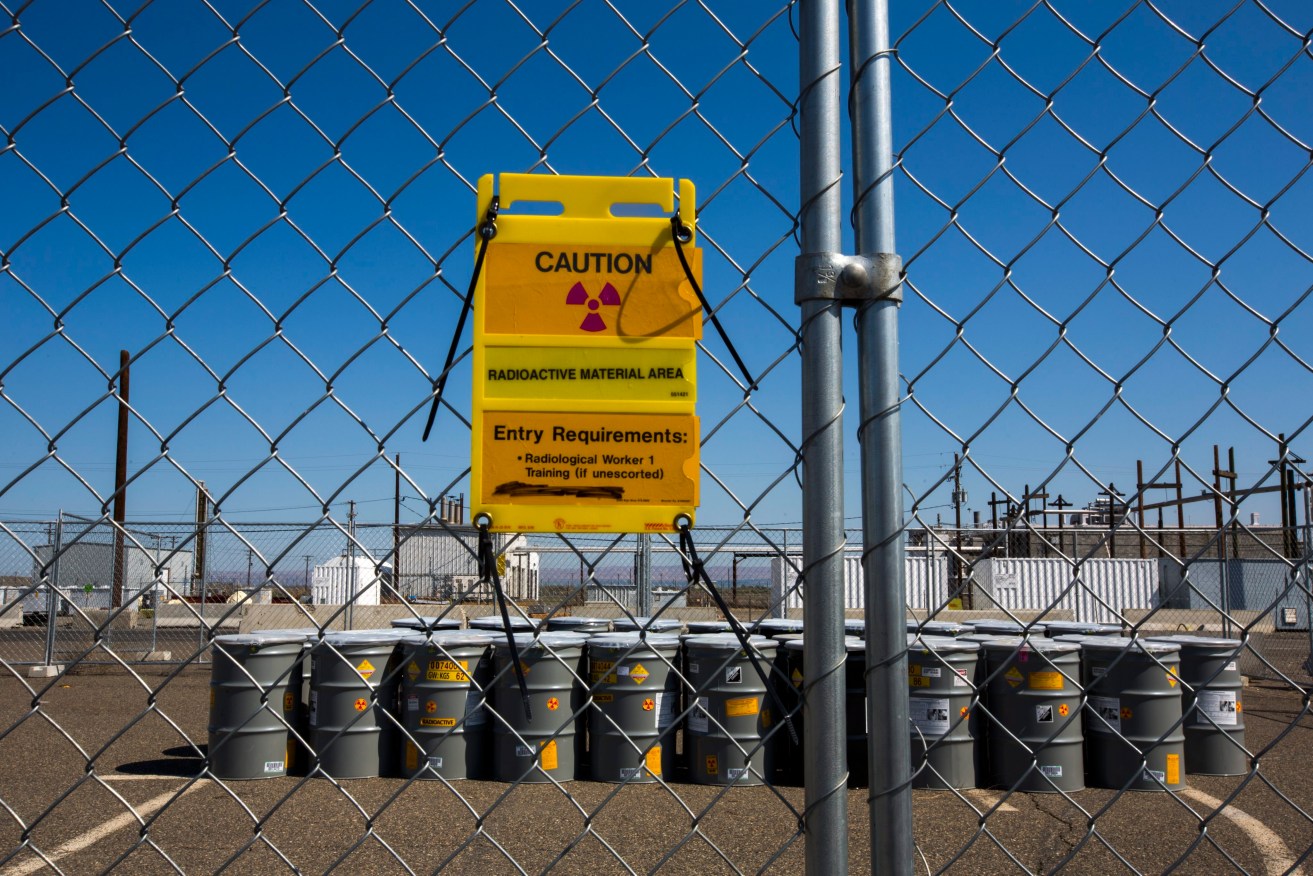Economic benefits of nuclear dump exaggerated: report
The multi-billion dollar benefits of establishing a local nuclear waste dump were grossly exaggerated in last month’s royal commission tentative findings, according to a response by the Australia Institute released today.

Nuclear waste from around the world could be shipped to Australia if the repository plan goes ahead. Photo: JIM LO SCALZO, EPA.
The left-wing think tank, which has long railed against expanding Australia’s involvement in the nuclear fuel cycle, has published its response to the tentative findings of Kevin Scarce’s inquiry, “Digging for Answers”, which argues the economic assumptions underpinning the pro-repository conclusion were fundamentally flawed.
As InDaily revealed last week, the institute’s chief economist Richard Denniss will today brief MPs in state parliament on the report’s findings, in a seminar convened by Greens MLC Mark Parnell and Labor backbencher Steph Key.
The report argues the primary beneficiaries of a nuclear storage industry would not be South Australian taxpayers, but “companies involved in the international nuclear industry, [which] are anxious to reduce financing and other costs, as nuclear power is already uncompetitive with most other generation technologies”.
The Australia Institute is scathing about the methodology of consultancy firm by Jacobs MCM, which provided the data underpinning Scarce’s conclusions.
“Jacobs assume that some 37 countries could send waste to Australia [but] many of these countries are yet to develop nuclear programs, have their own storage options, or have contractual obligations to other countries,” the report argues, adding that the much-cited potential economic benefits to SA “such as over $5 billion per year in revenue… should be closely questioned and have not received adequate scrutiny from the Royal Commission so far”.
“There is no data on the prices that the South Australian proposals might attract [and] estimating the price that environmental externalities might attract in such a market is notoriously difficult,” it says.
Denniss told InDaily: “When it comes to economic modeling it’s always the same: garbage in – garbage out.”
“If the assumptions are wrong, then the conclusions are wrong, and the Jacobs report has a very optimistic assumption for the price that other countries will be willing to pay for storage of nuclear waste,” he said.
“They’re very optimistic about the number of countries that will want to pay for this service and they’re very optimistic about the future of the nuclear industry as a whole, where many people think renewable energy will get cheaper and cheaper and displace the existing nuclear energy industry.
“If any of those assumptions are optimistic, the business base for the dump is exaggerated.”
Deniss argues that “if any other industry said ‘start building us $145 billion worth of infrastructure, it will take 120 years to finish, we’ll start paying you in 10 years, trust us’, they’d be laughed out of town”.
“This proposal is about SA taxpayers picking up the tab to help nuclear companies out of the economic hole they’re in,” he said.
He argues the business case is also predicated on “cheap, above-ground storage… for nearly a century before it’s all ultimately, expensively put underground”.
“But if this project goes belly-up halfway through, SA will be left with all the waste and none of the future revenues,” he said.
The Australia Institute made a submission to the Royal Commission, the central themes of which are echoed in today’s response. That submission – championed by the SA Conservation Council – led to a heated social media exchange between pro-nuclear scientist Ben Heard and the institute’s economist Rod Campbell – who co-authored today’s response.
This "report" is little more than anti-nuclear activism in a cheap wig https://t.co/di1bn3tOFm . So sadly typical of a movement in crisis.
— Ben Heard (@BenPHeard) February 11, 2016
Ha! Ive seen some lame comebacks to TAI research, but @BenThinkClimate takes the cake. Get tips frm @MineralsCouncil https://t.co/z6YPResaMB
— Roderick Campbell (@R_o_d_C) February 11, 2016
“We’re always vocal opponents of people who use exaggerated economic claims to sell projects that would otherwise be unpopular,” Denniss said today of the institute’s anti-nuclear stance.
“Not many South Australians have a long-term desire to have a nuclear waste dump, but some of them believe if the state can make a lot of money out of it, maybe it’s worth doing… the problem is reports like the Jacobs report exaggerate the likely benefits to SA, while minimising debate about the very real economic and environmental and human risks of having a high-level nuclear waste dump.”
Conservation Council SA chief Craig Wilkins – a former adviser to Parnell who has also held a briefing for Key’s Ashford sub-branch – again seized on the Australia Institute’s research today, saying it “confirms what many South Australians suspect – the dump proposal being pushed by the Royal Commission seems way too good to be true”.
“The big question is: if it such as good deal, then why aren’t other countries rushing to do it?” he said.
“Something just doesn’t add up.”
The institute this week also released results of a ReachTEL poll of 1077 SA residents, suggesting 37.2 per cent of South Australians supported the dump proposal, with 48.5 per cent opposed and 14.3 per cent undecided.
Of those who supported it, 48.8 per cent were Liberal voters, while only 28.5 per cent voted Labor.
Unsurprisingly, the poll found 71 per cent of Greens supporters opposed the waste repository.
UniSA economist and InDaily columnist Richard Blandy – who has also written against the economic imperative for a waste dump – joined Denniss at a media conference at the Grosvenor Hotel this morning. By chance, over the road in parliament, the Government was introducing legislative changes to allow unfettered debate about the establishment of a nuclear storage facility.




